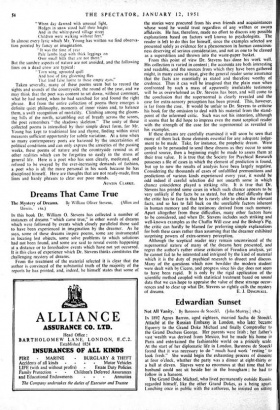Dreams That Came True
The Mystery of Dreams. By William Oliver Stevens. (Allen and Unw in. 16s.) IN this book Dr. William 0. Stevens has collected a number of instances of dreams 'which came true," in other words of dreams which were followed by events which closely paralleled those said to have been experienced in imagination by the dreamer. As he says, some of these dreams inspire poems, some are instrumental in locating lost objects, some solve problems to which solutions had not been found, and some are said to reveal events happening at a distance or to foreshadow events which have not yet occurred. It is this class of experience which Dr. Stevens thinks constitutes the challenging mystery of dreams.
From the treatment of the material selected it is clear that the author is convinced of the substantial truth of the majority of the reports he has printed, and, indeed, he himself states that some of the stories were procured from his own friends and acquaintances whose word he would trust regardless of any written or sworn affidavits. He has, therefore, made no effort to discuss any possible explanations based on factors well known to psycbologists. The reader is left to do this for himself, since the examples selected are presented solely as evidence for a phenomenon in human conscious- ness deserving of serious consideration, and not as one to be classed as a superstition and thrown into the waste-paper basket.
From this point of view Dr. Stevens has done his work well. His collection is varied in content ; the accounts are both interesting and readable, and the sources from which they have been gathered might, in many cases at least, give the general reader some assurance that the facts are essentially as stated and therefore worthy of credence. Thus it can well be imagined that the plain man when confronted by such a mass of apparently irrefutable testimony will be as overwhelmed as Dr. Stevens has been, and will come to the conclusion that the supernormal is clearly revealed and the case for extra-sensory perception has been proved. This, however, is far from the case. It would be unfair to Dr. Stevens to criticise his book for the omission to deal with his material from the stand- point of the informed critic. Such was not his intention, although it seems that he did hope to impress even the most sceptical reader with the strength of the case for the supernormal as revealed in his examples.
If these dreams are carefully examined it will soon be seen that many of them lack those elements essential for any adequate judge- ment to be made. Take, for instance, the prophetic dream. Were people to be persuaded to send these dreams as they occur to some central source, then a beginning might be made to assess them at their true value. It is true that the Society for Psychical Research possesses a file of cases in which the element of prediction is found, but up to now the results of analysis have been largely negative. Considering the thousands of cases of unfulfilled premonitions and predictions of various kinds experienced every year, it would be odd indeed if careful selection did not unearth some in which chance coincidence played a striking role. It is true that Dr. Stevens has printed some cases in which such chance appears to be very unlikely if the facts be as stated, but the chief difficulty that the critic has to face is that he is rarely able to obtain the relevant facts, and so has to fall back on the unreliable factors inherent in human memory and the testimony derived from such memory. Apart altogether from these difficulties, many other factors have to be considered, and when Dr. Stevens includes such striking and well-known examples as the Chaffin Will case and the Bishop's Pig. the critic can hardly be blamed for preferring simple explanations for both these cases rather than assuming that the dreamer exhibited surprising powers of extra-sensory perception.
Although the sceptical reader may remain unconvinced of the supernormal nature of many of the dreams here presented, and regret the author's rather otiose criticism of Freudian analysis, yet he cannot fail to be interested and intrigued by the kind of material which it is the duty of psychical research to dissect and discuss. Many of the questions which now bewilder the modern student were dealt with by Cicero, and progress since his day does not seem to have been rapid. It is only by the rigid application of the scientific method coupled with statistical treatment based on sound data that we can_bope to appraise the value of these strange occur- rences and to clear up what Dr. Stevens so rightly calls the mystery


































 Previous page
Previous page